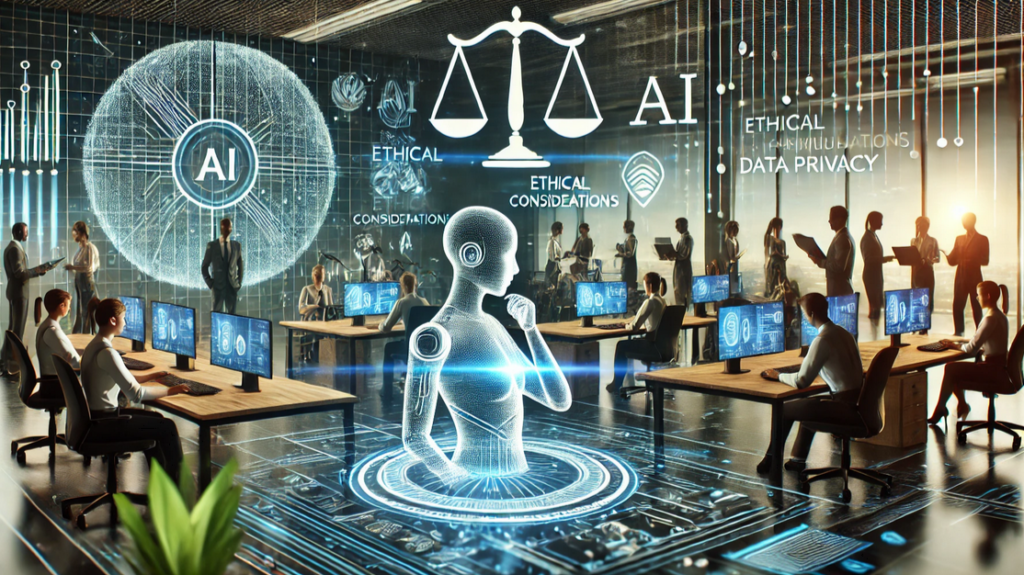
As Artificial Intelligence (AI) continues to revolutionize how businesses operate, its integration into the workplace raises important ethical questions. From hiring and employee monitoring to decision-making and data handling, the use of AI must be guided by ethical principles to ensure fairness, transparency, and trust. Understanding these implications is not just a matter of regulatory compliance—it’s about shaping a responsible and sustainable future of work.
In this blog, we’ll explore the key ethical concerns surrounding AI in the workplace, examine real-world examples, and outline best practices for employers and employees.
1. The Importance of Ethical AI in the Workplace
AI systems are increasingly involved in:
- Hiring and recruitment processes
- Employee monitoring and productivity tracking
- Workflow automation and task assignment
- Decision support in areas like promotions and terminations
Each of these applications can significantly impact employees’ careers and well-being. If not implemented responsibly, AI can lead to biased decisions, privacy violations, and workplace inequality.
Why it matters:
- Employee trust: Workers are more likely to engage with AI systems they perceive as fair and respectful of their rights.
- Reputation management: Ethical missteps can lead to public backlash and loss of customer or stakeholder confidence.
- Regulatory compliance: Laws around AI use in employment are tightening, especially in regions like the EU and the U.S.
2. Key Ethical Issues of AI in the Workplace
A. Bias and Discrimination
AI models often learn from historical data, which may contain human biases. If unchecked, AI can reinforce or even amplify discrimination in hiring, pay, promotions, or disciplinary action.
Example: In 2018, Amazon scrapped an AI hiring tool after discovering it favored male candidates due to biased historical data.
Mitigation:
- Use diverse and representative training data
- Regularly audit AI decisions for fairness
- Involve human oversight in final decisions
B. Employee Privacy
AI tools are frequently used for employee monitoring—tracking keystrokes, emails, video feeds, and even biometric data. While intended to improve productivity or ensure compliance, these practices can create a sense of surveillance and mistrust.
Key concerns:
- Overreach in surveillance
- Lack of informed consent
- Misuse or breach of sensitive data
Solution: Implement clear policies, anonymize data where possible, and prioritize transparency in data collection practices.
C. Transparency and Explainability
Many AI systems operate as “black boxes,” making decisions that are difficult to interpret or explain. For employees affected by these systems, the lack of transparency can lead to frustration or legal challenges.
Ethical approach:
- Choose AI tools with explainable outputs
- Provide clear documentation of how decisions are made
- Allow employees to challenge or appeal AI-driven decisions
D. Autonomy and Control
AI may automate decisions or actions that were once human-controlled, potentially reducing employee autonomy. Workers should not feel like they are being micromanaged by algorithms.
Balance to strike:
- Augment rather than replace human judgment
- Allow room for human override or intervention
- Use AI to assist, not dominate, decision-making
E. Job Displacement and Economic Inequality
AI can increase efficiency, but it also risks displacing workers whose roles become automated. Without proper planning, this could widen the gap between tech-savvy and lower-skilled workers.
Proactive solutions:
- Invest in upskilling and reskilling programs
- Create new roles that complement AI capabilities
- Include ethics-focused HR strategies in AI adoption
F. Informed Consent and Communication
Employees must be aware of when and how AI is being used, especially in sensitive areas like surveillance or performance evaluation.
Best practice:
- Provide clear opt-in or opt-out options where feasible
- Hold open discussions and Q&A sessions on AI usage
- Share the goals and limitations of each AI tool used
3. Legal and Regulatory Considerations
Governments and regulators are beginning to address ethical concerns with specific laws around AI in employment. For instance:
- The EU AI Act (proposed): classifies AI systems used in employment as “high-risk” and imposes strict requirements.
- New York City requires companies to audit AI hiring tools for bias.
- Illinois’ Biometric Information Privacy Act (BIPA) regulates the collection of facial recognition data and other biometrics.
Companies must:
- Stay informed about local and international AI regulations
- Consult legal experts during AI implementation
- Maintain documentation of AI use and compliance
4. Best Practices for Ethical AI Integration
1. Conduct Ethical Impact Assessments
Before deploying any AI system, evaluate its potential social, psychological, and legal impacts.
2. Form an AI Ethics Committee
Establish a cross-functional group including HR, IT, legal, and employee representatives to oversee AI-related decisions.
3. Prioritize Human-in-the-Loop Designs
Keep humans in control of critical workplace decisions, especially those involving disciplinary actions, promotions, or layoffs.
4. Foster Transparency and Communication
Encourage a workplace culture where employees feel informed and heard. Provide regular updates and invite feedback.
5. Partner with Ethical AI Vendors
Work with AI providers that emphasize fairness, explainability, and accountability in their products.
6. Create a Grievance Redressal System
Enable employees to raise concerns or challenge AI-related decisions through a formal channel.
5. The Role of Leadership and Culture
Integrating ethical AI is not just a technical issue—it’s a cultural one. Leaders must champion responsible AI use and set the tone for organizational values.
What leaders can do:
- Lead by example in transparent and ethical behavior
- Encourage cross-department collaboration on AI projects
- Make ethics a KPI in AI-driven performance evaluations
Conclusion: Ethical AI is Good Business
AI in the workplace has the potential to unlock incredible efficiency, innovation, and employee satisfaction. But without a strong ethical framework, it risks eroding trust, increasing inequality, and inviting legal trouble.
By addressing bias, ensuring transparency, safeguarding privacy, and involving human oversight, businesses can build AI systems that are not just powerful—but also principled. In the age of intelligent machines, it’s ethics that will separate the best workplaces from the rest.